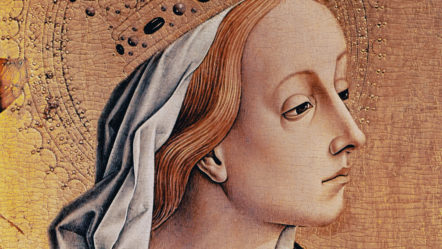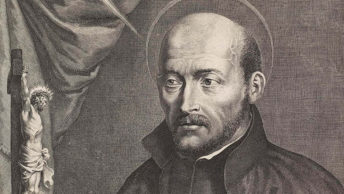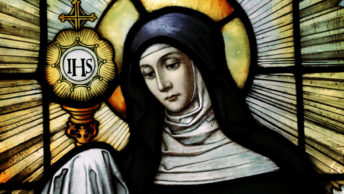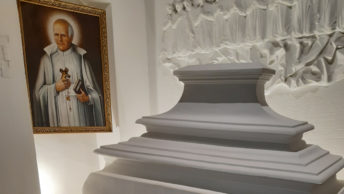In late November, we celebrated the great feast of St Catherine of Alexandria. Whenever we think of her we cannot not mention her outstanding courage and resolve to follow Christ until the end.
It was not a joke that an eighteen year old woman, especially in those days of huge conflict which fuelled the political and social turmoil of the time, would challenge the tyranny of a wicked pagan emperor Maximinus Daia. However, Catherine would make her own Jesus’ eternal words: Truly, truly, I say to you, unless a grain of wheat falls into the earth and dies, it remains alone; but if it dies, it bears much fruit. He who loves his life loses it, and he who hates his life in this world will keep it for eternal life. (John 12:24-25)
When she came across the wisdom of Christ, the wisdom of the Cross, Catherine made it her own. She understood what St Paul wrote in his letter to the Corinthians, in its very first chapter, when he exhorted them: For Christ did not send me to baptize but to preach the gospel, and not with eloquent wisdom, lest the cross of Christ be emptied of its power. For the word of the cross is folly to those who are perishing, but to us who are being saved it is the power of God. For it is written, “I will destroy the wisdom of the wise, and the cleverness of the clever I will thwart.” Where is the wise man? Where is the scribe? Where is the debater of this age? Has not God made foolish the wisdom of the world? For since, in the wisdom of God, the world did not know God through wisdom, it pleased God through the folly of what we preach to save those who believe. For Jews demand signs and Greeks seek wisdom, but we preach Christ crucified, a stumbling block to Jews and folly to Gentiles, but to those who are called, both Jews and Greeks, Christ the power of God and the wisdom of God. For the foolishness of God is wiser than men, and the weakness of God is stronger than men. (1 Cor 1:17-25)
Here is the great Catherine, fully enamoured with Christ, impressively determined to let God’s Spirit use her to convert the wise men at the court of the emperor to the true God, who revealed himself entirely in the person of Jesus Christ, the God made man. The wisdom of the Gospel, which filled Catherine’s life, was shown through good works impregnated with the mercy of Our Father in Heaven. In his letter St James would help us appreciate the real wisdom, God’s wisdom, which was flowing from Catherine’s heart because she welcomed Jesus totally in her heart. But if you have bitter jealousy and selfish ambition in your hearts, do not boast and be false to the truth. This wisdom is not such as comes down from above, but is earthly, unspiritual, devilish. For where jealousy and selfish ambition exist, there will be disorder and every vile practice. But the wisdom from above is first pure, then peaceable, gentle, open to reason, full of mercy and good fruits, without uncertainty or insincerity. And the harvest of righteousness is sown in peace by those who make peace. (James 3:14-18)
In her great love for Jesus Catherine tried to deliver the emperor from his bitter jealousy, selfish ambition, thus a completely disordered life and vile spiritual attitudes. Clearly, the emperor was a victim of his unspiritual devilish conduct and wayward approach to the truth. His life was a cacophony of falsehood.
Let us now let the eminent French bishop and theologian, Jacques-Bénigne Lignel Bossuet (27 September 1627–12 April 1704) enlighten us to appreciate who St Catherine really was. This is how he preached about her in his famous panegyric on St Catherine:
O blessed Catharine, accept us as thy disciples. In thy person, philosophy, true to its beautiful name, leads us to Eternal Wisdom, truth leads to goodness, and science to Christ who is the way, the truth, and the life. “O curious inquirers, who delight in idle, fruitless speculation, exclaims the most eloquent of thy panegyrists, know that the brilliant light of science which enchants you, is not intended merely to please your eyes, but to guide your steps and rule your conduct. Vain minds, that make such pompous display of your learning in order to win men’s praise, learn that this glorious talent has not been entrusted to you for your self-advancement, but for the triumph of the truth. And you, cowardly, sordid souls, who use science as a means of gaining earthly goods, consider seriously that so divine a treasure is not meant to be traded within so unworthy a manner; and that the only commerce it is concerned with, is of a higher and sublimer kind, viz : the redemption of souls…
Thus, O Catharine, thou didst employ thy science solely for the truth. Thou madest “the majesty of Jesus Christ so visible, that his presence dissipated all the errors of philosophy, and the truths it had usurped acknowledged him for their Master, or rather were gathered up in him as in their centre. Let us learn from this holy example to bear witness to the truth and to make it triumph over the world, employing all our light of knowledge in the fulfilment of this duty. O holy truth! I owe thee the testimony of my words, of my life, of my blood: for the truth is God himself…
Bossuet’s brilliant oration is happily met with an outstanding liturgical composition in the form of a Sequence from the Gradual of St Victor’s, undoubtedly the most beautiful and touching Responsory which is still being used by the Friars Preachers up to this day. Here we can really notice how God’s grace triumphed in the most humble, wise, determined and brave Catherine.
Let the voices of our choir resound in praise of our Creator, who disposes all things; by whom they fight who are unskilled in war, by whose power maidens triumph over men.
Through him, the people of Alexandria stand amazed to see in blessed Catharine qualities that seem above her sex, when she vanquishes learned men by her science and the sword by her courage.
To the glory of her race she adds the precious ornaments of incomparable virtue; and noble by birth, she becomes more noble still by grace and holy living.
Tender is the flower of her beauty, yet she spares it neither labour nor study; and in early youth she masters earthly science and that which is of God.
A chosen vessel full of virtue, she considers transitory goods as mire, contemning her father’s wealth and her ample patrimony.
Pilling her vessel with oil, as a wise and prudent virgin, she goes to meet the Spouse ; that, ready at the hour of his coming, she may enter without delay to the feast.
Longing to die for Christ, she is led before the emperor; and in his presence, by her eloquence, puts fifty philosophers to silence.
For love of God she endures the horrors of the prison, the cruel wheel, hunger and want, and all her other sufferings; she remains unchanged through all.
The tortured overcomes her torturer, a woman’s constancy triumphs over the emperor; yea, the emperor himself is tormented, seeing both executioner and torments unavailing.
At length she is beheaded, and by death ending death, enters into the joys of life, while Angels with all care bury her body in a far-off land.
An oil flowing from her body, by a visible grace heals the sick; good indeed is the unction she gives us, if she heals our vices by her prayers.
May she rejoice to see the joy she causes us; may she who gives us present joys give likewise those to come; and may she now rejoice with us, and we with her in glory. Amen.
Almighty everlasting God, who gave Saint Catherine of Alexandria to your people as a Virgin and an invincible Martyr, grant that, through her intercession, may we be strengthened in faith and constancy and spend ourselves without reserve for the unity of the Church. Amen.








